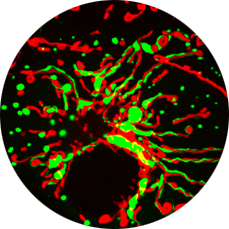 The health of a human being starts with successful sperm-egg fusion and continues through a plethora of molecular recognition and membrane remodeling events, including the construction of the musculoskeletal system and the systems that manage our response to internal and environmental stress. Traditionally, studies of these processes are divided into biochemistry, cell biology, virology, toxicology, etc. However, nature does not know these artificial divisions, and new understandings emerge from the crucible that interfaces mathematically minded physical scientists with biomedical researchers. The Physical Biology and Medicine (PBM) Affinity Group approaches human development in health and pathology as an integral process and thus encompasses biophysicists, physical chemists, structural biologists, cell biologists, and virologists applying a multidisciplinary approach to problems to prevent chronic illness, ameliorate disabilities, and guide physicians.
The health of a human being starts with successful sperm-egg fusion and continues through a plethora of molecular recognition and membrane remodeling events, including the construction of the musculoskeletal system and the systems that manage our response to internal and environmental stress. Traditionally, studies of these processes are divided into biochemistry, cell biology, virology, toxicology, etc. However, nature does not know these artificial divisions, and new understandings emerge from the crucible that interfaces mathematically minded physical scientists with biomedical researchers. The Physical Biology and Medicine (PBM) Affinity Group approaches human development in health and pathology as an integral process and thus encompasses biophysicists, physical chemists, structural biologists, cell biologists, and virologists applying a multidisciplinary approach to problems to prevent chronic illness, ameliorate disabilities, and guide physicians.
As a group we identify and address knowledge gaps that are limiting advancement in medicine and which are amenable to biophysical and molecular characterization. Our approach is based on a deep knowledge of both the statistical mechanics of macromolecular function and polymer dynamics as well as the physics of membrane mechanics, transport and electrophysiology. Our group has applied this physical approach to resolve previously opaque molecular mechanisms of key importance in chronic and acute diseases, including mechanisms of membrane fusion and fission, channel and membrane permeation, protein-lipid interactions and protein functional regulation.
Labs within this group:

 BACK TO TOP
BACK TO TOP